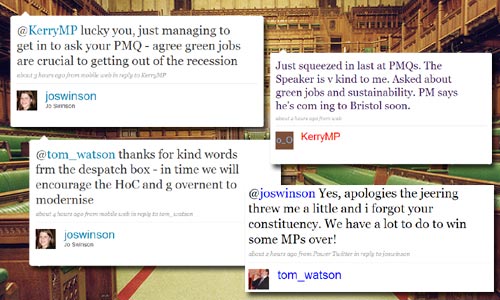
Much excitement over the weekend at the launch of LabourList, describing itself as ‘the must read online forum for Labour minded people’. Edited by Derek Draper, taking three days a week (he tells the Mail On Sunday) out of his job as a psychotherapist, the site is keen to stress its independence; but nobody’s doubting its official endorsement, and it’s built and hosted by Tangent Labs who handle all Labour’s official stuff.
Back in September, I was an observer at a fringe meeting at the Labour conference, addressed by Draper. As I wrote at the time, the discussion highlighted the fact that LabourHome was neither able to match ConservativeHome head-on; nor was it trying to. ‘With no disrespect to the many valiant amateurs, in the room and on the web,’ I wrote somewhat presciently, ‘there’s nobody of sufficient prominence taking on the Dales and Montgomeries, and fighting Labour’s corner.’
LabourList pretty much delivers on that score, anyway. Looking down the left-hand column, it’s like a who’s-who of the left: household names like Piers Morgan, Ken Livingstone and Peter Mandelson; up-and-coming figures like David Lammy; insiders like Draper, Charlie Whelan, Philip Gould and Ben Wegg-Prosser; blogging veterans like Luke Akehurst and LabourHome guys Jag Singh and Mark Hanson… impressive stuff. Although of course, barely 36 hours after its launch, most of the content is still ‘not published yet’.
Most interesting for me, perhaps, will be the involvement of two Cabinet ministers – Mandelson from BERR, and DFID’s Douglas Alexander. Will they be able to touch on any aspects of their day jobs, in any substantial way, or can it only be party campaigning stuff? Of course, if Mr Alexander wishes to blog about his day job, there’s a first-rate blogging platform ready and waiting. 🙂
Draper is quick to tackle any perception that LabourList will try to undermine the (occasionally troublesome) LabourHome. ‘I want to make it clear that I don’t see LabourList and Labourhome as being rivals,’ he writes; ‘quite the contrary, we should be comrades.’ It could work out to be quite a useful double-act, actually – and at least it’ll put a stop to the never-flattering comparisons with ConHome.
I’m inclined to share Jon Worth’s suspicion about the choice of the Tangent Labs platform, though – ‘proprietary software that was not designed for blogging’, when WordPress would have done the job perfectly. On a functional level it’s fine, I suppose; but visually it’s pretty awful – and the URLs are just horrible. There are RSS feeds a-plenty, although most people won’t spot most of them. And I wouldn’t have shown all those comments on the homepage, pushing the second story way out of view.
One substantial plus point, though, is their up-front approach to moderation. You need to register as a member to comment, although you don’t need to be a Party member. And once you’re in:
If your comments are deemed to be offensive, they will be removed completely. [But…] In order to ensure an insightful, engaging debate we will also place other comments judged to be grossly unintelligent or obtuse or trolls in our trash can. These comments can however still be viewed by users by clicking on the “include trash comments” button under each post. We encourage anyone who has had a comment denied to repost their thoughts on their own blog, and leave a trackback instead. Although we might think a comment is inappropriate for our conversation that does not preclude you making your point elsewhere.
However, I’m really not sure about the inclusion of the ‘Latest News from the Prime Minister’s Spokesperson’ on the homepage: the divide between Government and Party is difficult enough, without drawing attention to it like this. And I’m genuinely a bit shocked to see a prominent promo for FixMyStreet – alongside similar promos for the TUC, Unite, and a couple of other Labour Party initiatives. What’s the MySociety line on that, I wonder?
Mandelson’s opening piece is very significant, with implications beyond party politics. ‘The Labour party itself is now moving to the forefront of new media and online campaigning,’ he declares – er, OK, go on. ‘The world has changed since 1997. Now, no-one has been more identified with message and campaigning discipline than myself, something that makes me rather proud… But when it comes to new media we have to recognise that the days of command and control are over. Instead we need to learn to embrace and engage.’
[I’m assuming, by the way, that the Second Life thing was solely to give the newspapers a pretty picture to print; otherwise it’s a screengrab of a half-empty site. And yes of course, I fell for it too. But I can’t believe the party is seriously converting its minimal funds into Linden dollars.]
So, let battle commence. Last week, the LibDems announced the formation of a New Technology Board ‘to oversee the party’s online campaigning’ ahead of the next general election; it’s to be chaired by blogger and Twitterer Lynne Featherstone. Plus of course, the Tories under Cameron have been trying to mark out this territory as their own for some time. Is this a win-win-win situation for those of us trying to evangelise to government?



